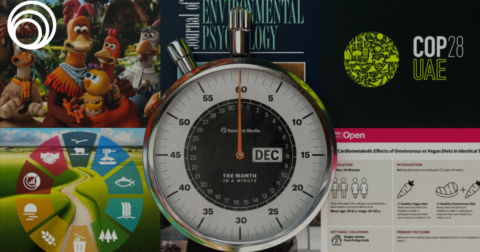Analysis
The Month in a Minute: December 2024
Month in a Minute•2 min read
Analysis
December’s top stories in farming, climate and food in 60 seconds.


Words by Sentient Media
This month, COP28 made headlines for dedicating an entire day to the food system and its role in climate change. In a first for the summit, leaders agreed to reduce emissions from food. Also new this year: a record number of lobbyists for the meat and dairy industries even as the event’s menu featured fewer animal products than ever before. Meanwhile, the UN called on the world to “ramp up meat production” to address “health challenges” in poorer countries, as critics argued the agency had “completely bought the narratives of the meat industry.”
Plus:
Germany announces €38 million to help transition toward sustainable proteins.
New research confirms that British consumers want mandatory welfare and sustainability labels for animal products.
Vegan food firm, VBites, collapses due to a “combination of corporate greed and poor management, the cost of living crisis” and other factors, says founder Heather Mills.
Here are more headlines that caught our attention this month:
The mixed messages kids get about meat — and how we should think about them — is explained perfectly by the Chicken Run movies.
From farm to plate, one in four animals raised on factory farms are wasted. One of the key ways to reduce the number of animals on factory farms would be to simply waste less meat.
New research reveals surprising complexity in the minds of goats, pigs and other livestock.
In a move straight out of the “clean coal” playbook, the meat industry is touting its new climate-friendly meat, made “clean” thanks to genetic engineering and feed additives.
Millions of animals die in floods and wildfires each year. Should factory farms be required to have a relocation plan?
Despite industry claims, the evidence suggests climate-friendly beef is a fallacy.
Biodigesters that turn manure and other waste into fuel have been touted as a climate change solution, but some experts continue to advise caution due to environmental and public health concerns.
This year at COP28, a day was dedicated to agriculture. Though dozens of countries committed to cutting their agricultural emissions, there are numerous barriers to their success.
Drought in Zimbabwe has killed more than 100 elephants, as watering holes in the country’s national parks dry into puddles.
The Bezos Earth Fund committed $57 million to making food more climate friendly, including engineering livestock to produce less methane.
New research shows how a slew of recent “climate-neutral” pledges are based on sneaky accounting, which can be used to downplay the scope of methane pollution by the meat and dairy industries.
A shortage of rural veterinarians is causing farmers to struggle to comply with new FDA guidance mandating prescriptions for all on-farm use of medically important antibiotics.
In 2022, livestock producers bought 4 percent more medically important antibiotics than the year prior.
New research suggests that better disease prevention on farms also translates to fewer greenhouse gas emissions.
A study of identical twins reveals that those who ate vegan had better health outcomes than those following an omnivorous diet.
Egg prices are likely to start rising again after a deadly avian influenza outbreak hit the top U.S. producer.
A new program in Canada will pay cattle ranchers for reducing methane emissions.
The Walton Family Foundation invested in a Honduran lobster fishery, touting its sustainability record. Ten years later, an investigation reveals thousands of workers were injured or killed on the job.
Colorado livestock industry organizations are suing the state to prevent the reintroduction of gray wolves.
Federal investigators determined that the deaths of six poultry workers from a gas leak was “completely preventable.”
Suriname is getting ready to greenlight more Amazon deforestation to bolster a growing agriculture industry.
The dairy industry is leveraging celebrities — most recently Queen Latifah — to convince you that milk shaming is real, while covering up the industry’s very real problems.
A new UN assessment positions novel forms of protein — like cultivated meat — as a useful component in plans to cut the food system’s environmental impact.
At COP28, the EPA announced their plan for combating food waste nationally.
New research suggests many people are less likely to choose food products without meat and dairy if they’re labeled as “vegan” or “plant-based.”
Targets in COP28’s roadmap to end global hunger include cutting methane emissions from livestock by 25%, halving food waste and managing fisheries sustainably by 2030.